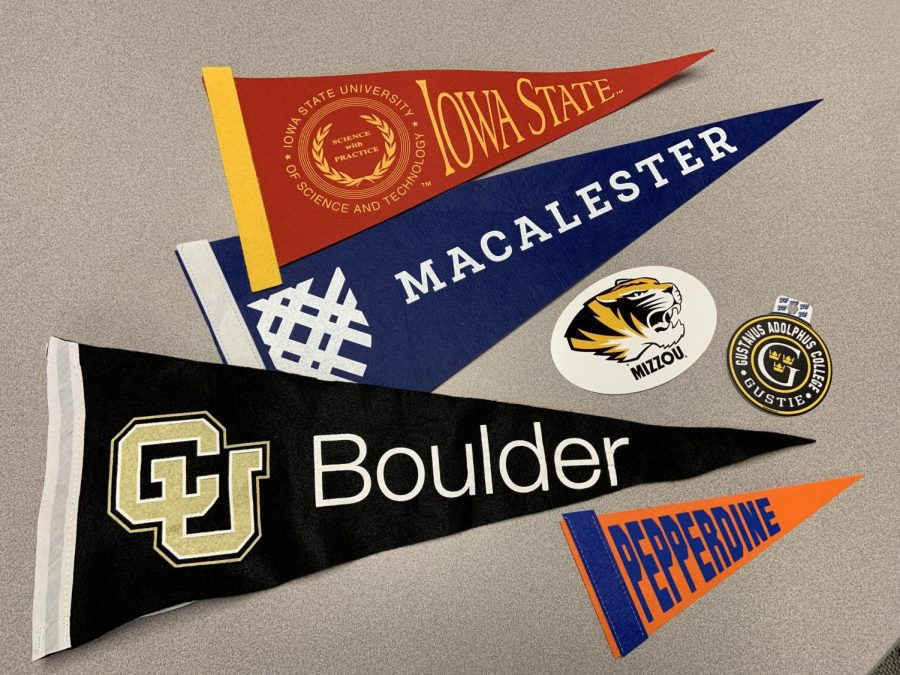What constitutes a good college education?
Assorted college banners showcasing a range of popular college options.
The college admissions path is perhaps the most stressful part of a student’s time before college, as to many it represents the course they are going to take in the beginning of their adult life. Above all, most are concerned with getting into a “good” college. But what does this mean? How do we define a good education? Is it getting into an Ivy, a school where you’ll make the most money after graduating, a school that teaches you a trade, or a school where you will be the most happy?
Statistics support one of the more traditional interpretations of what a “good” school is: salary potential. MIT tops a list compiled by payscale of schools ranked by salary potential in both bachelor’s and all alumni graduate categories. On that same list, Princeton, Stanford, Harvard, and UPenn rank third, fifth, sixth, and tenth respectively. Among the American military schools, the US Naval Academy comes in highest at third in all alumni graduate salary potential. The US Naval Academy, the US Military Academy, the US Air Force Academy, the US Merchant Marine Academy, and the US Coast Guard Academy rank third, seventh, twenty-first, thirtieth, and fifty-fourth respectively in the all alumni category. Hard numbers consistently support the prevailing idea that graduating from prestigious schools will result in a high salary. However, this raises the question as to whether a high salary even is a good indicator of a valuable education.
An art student or writing student may value an education that teaches them to better use and channel their creative faculties, for example. Even when operating in the mindset of a high potential salary being worth the most to a student, conventional wisdom would indicate someone who truly loves their job is less likely to burn out. According to an article in Slice, Physicians (one of the highest-paying jobs) are rated first in job burnout, along with emergency workers (such as police officers, firefighters, and nurses), certified public accountants and lawyers, which are both high-paying careers. Even more interestingly, hairstylists ranked lowest in job burnout, with jewelers and dog walkers also ranking along the lowest five. None of these are incredibly lucrative careers, but a common theme of jobs with low burnout is time spent in nature or some sort of creative profession. Geoscientists and biomedical engineers are also on the lowest five burnout professions, both high-paying, stable jobs.
Another consideration in education that can unfortunately be easily overlooked is mental health. A major downside of competitive schools, along with a major price-tag, is high rates of depression and suicide. UPenn, placed tenth on the list of highest salary potential, ranks first in this 2019 Humans of University list of universities with the most depressed student bodies. Carnegie Mellon, John Hopkins, Yale, Columbia, and Brown also make the top ten on this list, and the rest of it is scattered with Ivy-league schools. While highly competitive schools give students an exceedingly good chance at a high-paying career, this may come at the cost of overall mental health and well-being. This is especially concerning in the context of the mental health crisis sweeping the nation, along with the COVID-19 outbreak. According to Statista, 41% of US college students report symptoms of depression and 22% report severe depression.
In addition to the other factors mentioned, it’s important to accept that education comes in many different forms, beyond getting a degree and making money later in life. Experience with diversity is a very valuable experience, and college presents an excellent opportunity to meet those who come from different backgrounds. Studying abroad often allows students to be immersed in another nation’s culture, something that can’t be achieved when staying back home in the United States. Taking a gap year to join the Peace Corps or to do service in another country also provides hands-on experience and offers an opportunity to make a real, positive impact in the lives of others. Joining the military or army reserves can foster experiences with adversity and extreme challenge, and provides an opportunity to learn practical skills and adaptability in difficult situations. All of these are different and equally valuable forms of education.
Beyond making money and securing a successful career in the future, high school students and families should take many factors into consideration before choosing what college is best for them. Mental health is arguably the most important aspect of overall well-being, and when looking at colleges it should be one of the most important considerations. Additionally, parents and students should critically assess what their goal in education is – will students feel more fulfilled or happy pursuing a career that may be less lucrative? Ultimately, it’s time to move past the outdated obsession with making the most money or going to the most prestigious school.




































![Teacher Lore: Mr. Hillman [Podcast]](https://bsmknighterrant.org/wp-content/uploads/2025/03/teacherlorelogo-1200x685.png)





